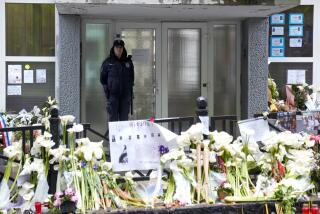Srebrenica’s Defenders Slipped Away With Their Guns, Serbs Charge : Bosnia: They accuse Muslims of evading disarmament carried out by the U.N. Canadians are ready to defend town.
BELGRADE, Yugoslavia — Rebel Serbs in Bosnia-Herzegovina on Thursday accused Muslims in Srebrenica of spiriting weapons and fighters out of the devastated town to evade U.N. efforts to disarm them.
After senior officers of the U.N. peacekeeping mission to the former Yugoslav republics said that Srebrenica had been “demilitarized,” rebel warlords protested that too few weapons had been turned in.
“The Muslims have given up a ridiculously small quantity of weapons, mostly outdated and unusable,” Bosnian Serb Gen. Manojlo Milovanovic complained to the Belgrade-based Tanjug news agency.
U.N. military sources said one armored personnel carrier was surrendered by Srebrenica’s defenders, along with a few dozen aged machine guns and rifles.
Milovanovic insisted that the Muslim defenders of Srebrenica must have escaped the eastern Bosnian enclave and taken their guns into the surrounding hills to bolster the defense of Zepa, another Serbian-besieged enclave.
The U.N. Protection Force commander, Gen. Lars-Eric Wahlgren, dismissed the Serbian complaint, saying the escape of encircled forces is an element of war “that has happened throughout history and could be expected.”
A U.N.-mediated cease-fire that has brought relative peace to Srebrenica called for demilitarization of the enclave, designated by the U.N. Security Council as a “safe area,” and for a pullback of Serbian forces now within a few hundred yards of the town center.
Wahlgren, in comments to reporters at U.N. mission headquarters in Zagreb, Croatia, appeared to warn the Bosnian Serbs that his troops are prepared to defend Srebrenica if the rebels resume their attacks.
About 150 Canadian troops have been deployed to Srebrenica to oversee the cease-fire and the distribution of humanitarian aid to desperately hungry and ill residents and refugees.
If the town is fired on, the Canadian peacekeepers will fire back, Wahlgren warned.
“The order is that they protect this demilitarized zone as peacekeepers,” the Swedish general said. “That means that if somebody tries to enter it with force, they will use force in self-defense.”
Wahlgren described the atmosphere in Srebrenica as hopeful for the first time in months because of the recent calm.
Bosnian Serb leader Radovan Karadzic had said his gunmen would not overrun the town once it was disarmed, but the Serbs probably expected a massive exodus of the 30,000 or so holdouts in Srebrenica that would have accomplished their goal of sweeping Muslims out of one of their last three refuges in eastern Bosnia.
Aid agency officials are no longer certain that large numbers want to leave.
“Many of these people are probably going to want to stay now if there is no more shooting,” said a Belgrade spokeswoman for the Office of the U.N. High Commissioner for Refugees.
Several aid convoys bringing food and medicine have reached the town in recent days, easing the plight of the sick and homeless.
Many of the Muslims in Srebrenica are victims of Serbian “ethnic cleansing” carried out in other eastern Bosnian regions and have been living on the run for a year.
Some are expected to take up the U.N. refugee agency’s offer of relocation to Tuzla, a government stronghold 45 miles to the north. But conditions there are deteriorating because aid is being hampered by outbreaks of Muslim-Croat fighting.
Those vicious gun battles between once-allied Muslims and Croats in central Bosnia continued to spread and consume new regions.
Tanjug said that the Bosnian Croat forces, known as the HVO, shelled Muslim troops near Kiseljak, just west of the capital of Sarajevo, and that there was intense fighting in and around the town of Jablanica, blocking the main relief route from the Adriatic coast to needy Muslims in the heart of the republic.
Sarajevo Radio said the HVO had also taken the town of Vares, another strategic point on the aid route to Tuzla, where tens of thousands of refugees depend on donated food.
More than 250 people, mostly civilians, have been killed in the fierce fighting that began week ago and has shattered what was left of the Croat-Muslim alliance against rebel Serbs.
U.N. officials had brokered a cease-fire Wednesday, but the peacekeepers’ field reports indicated widespread violations of the truce.
Well over 100,000 Bosnians have been killed in the year since Serbs rebelled against a vote by the majority Muslims and Croats to secede from Serb-dominated Yugoslavia. More than 2 million have been left homeless by warfare and ethnic cleansing.
More to Read
Sign up for Essential California
The most important California stories and recommendations in your inbox every morning.
You may occasionally receive promotional content from the Los Angeles Times.











